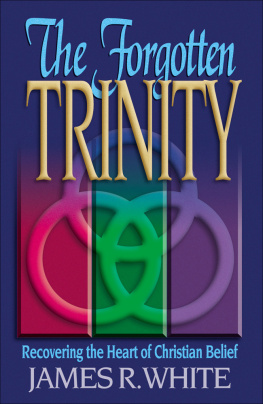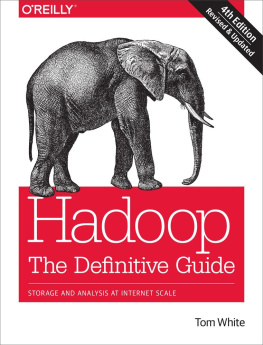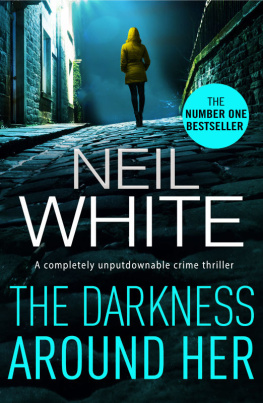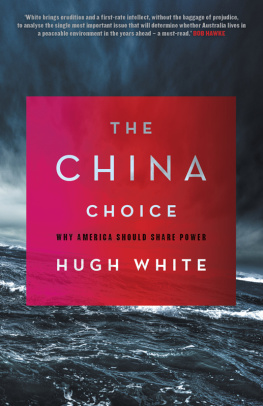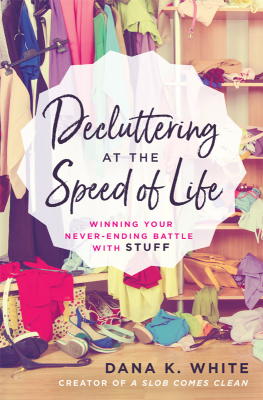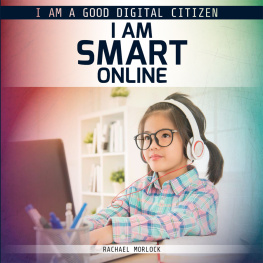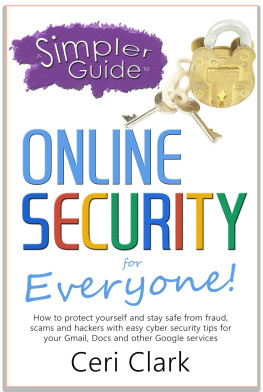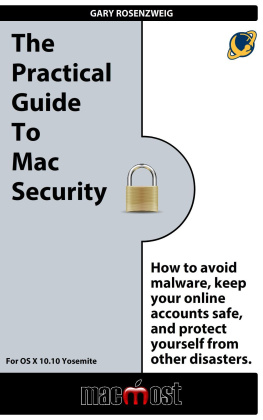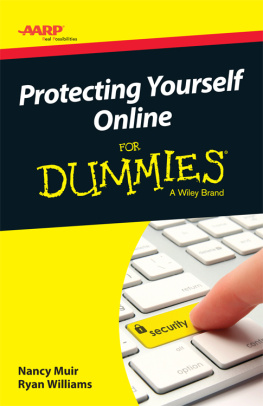White - Scams, Security and Over-Sharing: Controlling your information and staying safe online
Here you can read online White - Scams, Security and Over-Sharing: Controlling your information and staying safe online full text of the book (entire story) in english for free. Download pdf and epub, get meaning, cover and reviews about this ebook. year: 2021, publisher: Urbane Publications Ltd, genre: Religion. Description of the work, (preface) as well as reviews are available. Best literature library LitArk.com created for fans of good reading and offers a wide selection of genres:
Romance novel
Science fiction
Adventure
Detective
Science
History
Home and family
Prose
Art
Politics
Computer
Non-fiction
Religion
Business
Children
Humor
Choose a favorite category and find really read worthwhile books. Enjoy immersion in the world of imagination, feel the emotions of the characters or learn something new for yourself, make an fascinating discovery.

Scams, Security and Over-Sharing: Controlling your information and staying safe online: summary, description and annotation
We offer to read an annotation, description, summary or preface (depends on what the author of the book "Scams, Security and Over-Sharing: Controlling your information and staying safe online" wrote himself). If you haven't found the necessary information about the book — write in the comments, we will try to find it.
White: author's other books
Who wrote Scams, Security and Over-Sharing: Controlling your information and staying safe online? Find out the surname, the name of the author of the book and a list of all author's works by series.
Scams, Security and Over-Sharing: Controlling your information and staying safe online — read online for free the complete book (whole text) full work
Below is the text of the book, divided by pages. System saving the place of the last page read, allows you to conveniently read the book "Scams, Security and Over-Sharing: Controlling your information and staying safe online" online for free, without having to search again every time where you left off. Put a bookmark, and you can go to the page where you finished reading at any time.
Font size:
Interval:
Bookmark:
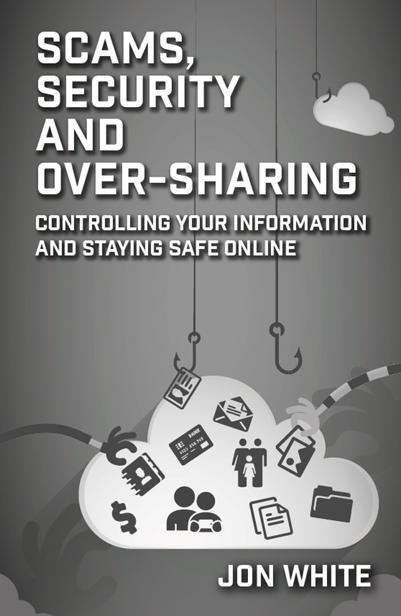
First published in Great Britain in 2020 by Urbane Publications Ltd
Unit E3 The Premier Centre Abbey Park Romsey SO51 9DG
Republished Independently in 2021
Copyright Jon White, 2020
The moral right of Jon White to be identified as the author of this work has been asserted in accordance with the Copyright, Designs and Patents Act of 1988.
All rights reserved. No part of this publication may be reproduced, stored in a retrieval system, or transmitted in any form or by any means, electronic, mechanical, photocopying, recording or otherwise, without the prior permission of both the copyright owner and the above publisher of this book.
A CIP catalogue record for this book is available from the British Library.
ISBN 979-8-531739-62-9
Design and Typeset by Michelle Morgan
Cover design by Michelle Morgan
DISCLAIMER
While this is a work of opinion, it is not a work of fiction. All the stories in this book actually happened. Some are my personal account, some are accounts of contacts, friends or acquaintances of mine and others are publicly reported incidents that I have learned and written about through research (and these accounts are referenced throughout). Some details have been deemed confidential and have been left out, and some of the accounts have also been anonymised by necessity, but they are all true accounts.
I guess the reason Im telling you this is because I know you may think many cybersecurity measures are the enemy of convenience when it comes to your online and mobile life. I also know that when I talk about online tracking and privacy, your response may be Ive got nothing to hide. On the flip side, you may care very much about your data privacy and security but perhaps you dont really know what actions you can take to improve it.
Throughout my career in technology and cybersecurity Ive learned from a great many extremely intelligent people and developed a relative depth of knowledge about what goes on in these arenas. Im not going to tell you to disconnect from everything and live in a cave I use a multitude of connected devices and services but I do think its best to combine your connected life with an awareness of the information youre giving away online, how youre being tracked and how you may be vulnerable to hackers.
Im not claiming to be a cybersecurity or online privacy expert, but I have spent much of my 15 year career in technology marketing and communications working with experts and its been my job to tell their stories in ways that grasp the imagination.
In this book, Im going to share some stories with you that will hopefully grasp your imagination and see you taking even just a few small steps to boost yours and your familys online privacy and cybersecurity. If this intrigues you then read on, if not and you have already bought this book, then thanks and please go and have a drink I would say on me, but the royalties from one sale wont cover a pint unfortunately.
Every effort has been made to ensure that the information in this book is accurate at the time of going to press. The tips in this book are meant as a guide and series of suggestions only and no responsibility can be taken by the author or publisher for any outcomes based on the material in this book.
In the meantime, stay safe and I hope you find this book useful.
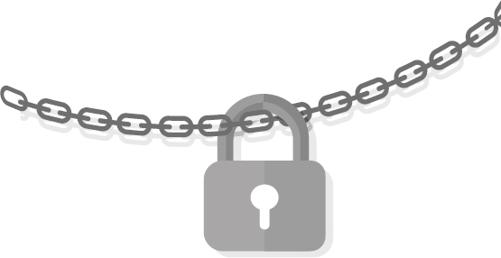
CONTENTS 

THATS TOO MUCH
Information
IN 2018, IT WAS ESTIMATED THAT BY 2020, 1.7MB OF DATA WOULD BE CREATED EVERY SECOND FOR EVERY PERSON ON EARTH DOMO
Theres no doubt that we live in the age of information. Thousands of platforms, channels and publications providing us with opportunities for interaction, engagement and, of course, a deluge of information some true, some dubious, some downright false (or fake). But is it too much? And, what happens to the information, or data, that many of us are constantly creating, uploading or broadcasting to online accounts, both public and private? The second section of this book will go into a lot more depth on these questions and the surrounding issues, but, in short, the title of this chapter gets straight to the point yes, it is too much (in this authors humble opinion of course).
Lets address the statistic above first though, as you may not know what 1.7MB of data constitutes. Well its roughly the size of one photo on a smart phone, or 173,000 words of text, which is being created every second times roughly seven billion. Thats an almost unfathomable amount of data and this situation has escalated extremely rapidly. A report from MediaPost in December 2016 cited data from IBM Marketing Cloud which stated that at that point 90% of the worlds data had been created in the past two years .
So why are we experiencing a potential information or data overload? Well, largely as a result of technical advances which enable all of us to pretty much upload and publish any text, photos and videos whenever we want, wherever we are. Social media itself has also become ubiquitous around the globe. The vast majority of us who are connected to the internet will have at least one social media account from adolescent cousins to grandparents who got their first mobile phone when they were in their forties (or later). Facebook alone has crossed geographical borders and cultural divides to amass two billion plus members and it also owns both WhatsApp and Instagram
Its clear that we like to share, or, in many cases, see what our friends and acquaintances are up to. But what about the over-sharers? Weve all seen them, you may even be one of them (consciously or sub-consciously). There are so many different types that post literally everything they can online, but the point is, whether youre selective about what you post or not, youre an over-sharer too. We all are, whether were aware of it or not.
In the real world, we live some of our lives in public and some behind closed doors and the two may be very different. However, on the internet there are no closed doors anymore. Password protection can be useless under the wrong scrutiny, anti-virus protocols cant keep up with the threats that are emerging and even many of those trusted with our most important information have shown themselves to be vulnerable time and again.
Many of us live our whole lives online. Its where we shop, order food, chat with friends, watch movies, listen to music, book travel, bank and so much more. Yet little do many of us realise how open we are being about our lives and with our information. Some peoples response, may be that they have nothing to hide and, as much as that may seem a reasonable response to many, its a point of view that will only ever be held by those who have never been adversely impacted by the inherent insecurity of our online lives.
As connectivity grows, so does the volume of data we give away. Think about a smart speaker, a smart heating system, even cars are likely to be connected in some way now. Connectivity means convenience and dont get me wrong, I take advantage of this connectivity as much as the next person. The point is that in this hyper-connected world we live in, we must be aware of not just the benefits, but also the dangers of ubiquitous connectivity, and of what we can do if things go wrong. Like alcohol, we should enjoy connectivity responsibly and there are many stories that illustrate why this is an important consideration, some of which we will go into later in the book.
Next pageFont size:
Interval:
Bookmark:
Similar books «Scams, Security and Over-Sharing: Controlling your information and staying safe online»
Look at similar books to Scams, Security and Over-Sharing: Controlling your information and staying safe online. We have selected literature similar in name and meaning in the hope of providing readers with more options to find new, interesting, not yet read works.
Discussion, reviews of the book Scams, Security and Over-Sharing: Controlling your information and staying safe online and just readers' own opinions. Leave your comments, write what you think about the work, its meaning or the main characters. Specify what exactly you liked and what you didn't like, and why you think so.

